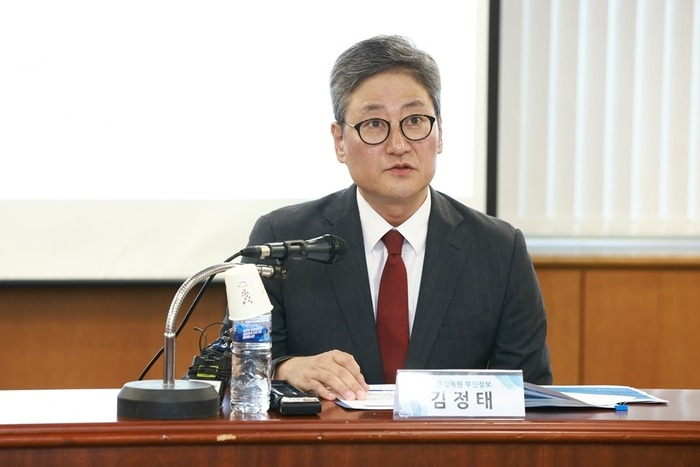Korean stock market
Korea warns foreigners of stricter rules on illegal short selling
Some 81% of illegal short sales over the past four years were committed by foreign firms; the cases are increasing yearly
By Sep 07, 2023 (Gmt+09:00)
3
Min read
Most Read
LG Chem to sell water filter business to Glenwood PE for $692 million


Kyobo Life poised to buy Japan’s SBI Group-owned savings bank


KT&G eyes overseas M&A after rejecting activist fund's offer


StockX in merger talks with Naver’s online reseller Kream


Mirae Asset to be named Korea Post’s core real estate fund operator



South Korea’s financial watchdog urged foreign brokerage firms to strengthen their internal control systems to ban illegal short selling on the Korean stock market, as some 81% of such trading is executed by overseas investment firms, the regulator said on Thursday.
“The Financial Supervisory Service (FSS) is seeing repeated illegal short selling and similar cases. We can’t blame unavoidable practices in sales on outlawed short selling any longer,” said Deputy Governor Kim Jungtae at a meeting with compliance officers from 23 foreign investment banks on Sept. 7.
Korea has strict regulations on short selling, which is limited to the main Kospi 200 Index and the junior Kosdaq 150 that list stocks with large market caps and ample liquidity. The Korea Exchange (KRX) rebalances the indices in June and December every year.
Naked short selling, a practice that short sells stocks without making borrowing arrangements first, is illegal in Korea. But the number of such cases increased from 14 in 2021 and 28 in 2022 to 27 in the January-August period of this year, according to FSS.
The financial market watchdog has imposed 10.2 billion won ($7.6 million) worth of penalties on the 27 investment firms so far this year. It fined 28 firms a combined 2.4 billion won in the whole of 2022.
The FSS has found 73 illegal short-sale cases over the past four years, 80.8% of which were committed by foreign brokerage houses. The financial regulator said some of them were aware that they hadn’t borrowed stocks and shorted illegally.
Global investment banks and institutional investors were among those fined by the FSS this year for illegal short sales of Korean shares.
UBS Group AG was fined 2.2 billion won in March of this year. The Swiss investment bank in May 2021 made illegal short-sell orders of SK Inc. stocks worth 7.3 billion won, of which 4.7 billion won was transacted.
Austria-based Erste Asset Management GmbH was charged a 3.9 billion won penalty in March. It ordered battery materials maker EcoPro HN Co. stocks worth 25.1 billion won that they hadn’t borrowed and executed a 4.9 billion won transaction in August 2021.
Mizuho Securities Asia Ltd., under Japan’s Mizuho Financial Group, was fined 734 million won in May by FSS. The brokerage house ordered illegal short sales of SK Inc. stocks worth 3.2 billion won in June 2021.
Canada’s second-largest pension fund CDPQ, or Caisse de dépôt et placement du Québec, also ordered 280 million won worth of battery materials producer EcoPro BM Co. shares that they hadn’t borrowed and completed a transaction of 130 million won in August 2021. The pension giant was fined 64.8 million won in May of this year.
JPMorgan Securities plc ordered illegal short selling of 3.7 million won worth of shares in S-Energy Co., a solar module producer. The brokerage firm traded 3.6 million won worth of shares and was fined 1.1 million won in May.
Most of the foreign firms insist that they mistakenly thought they had borrowed the shares or misunderstood the number of shares or stock tickers.
The FSS will intensify monitoring illegal short-selling practices and strictly deal with violations, and the regulator’s short-sale investigation team that was set up in June last year will lead such activities, an FSS official said.
Write to Sang Hoon Sung at uphoon@hankyung.com
Jihyun Kim edited this article.
More to Read
-
 BatteriesKoreans’ love for EcoPro stock may jeopardize short-sellers
BatteriesKoreans’ love for EcoPro stock may jeopardize short-sellersApr 12, 2023 (Gmt+09:00)
4 Min read -

-

-
 Short sellingForeign brokerages dominate S.Korea list of short sellers
Short sellingForeign brokerages dominate S.Korea list of short sellersNov 01, 2021 (Gmt+09:00)
2 Min read
Comment 0
LOG IN


